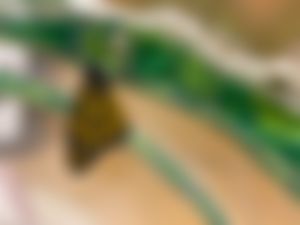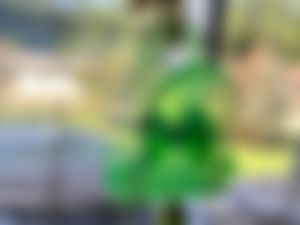Systemic Sustainability
Environmental Curriculum and Instruction
1.1 Curriculum and Instruction
Elementary & middle schools must provide one example of outdoor/environmental instruction per grade level.
High schools must provide one example of outdoor/environmental instruction in four subjects (which may include multiple different differents sciences).
Students learn about the needs of animals, and they survey their school grounds to learn their schoolyard has all of the pieces to meet the needs of squirrels.
Students learn importance of pollinators. Part of the lesson involved creating a habitat on school grounds to support pollinators. unit includes a field trip to Battle Creek Cypress Swamp or Flag Ponds depending on scheduling and buses.
Students learn the importance of recycling to conserve natural resources and to prevent the need for additional landfill space. There is a field trip to the landfill that goes with the unit along with a trip to AnnMarie Garden to learn more about composting. Each Student is given a reusable bag that the decorate and these bags are handed out at the local market on Earth Day.
This unit engages students in a study of the problems terrapin's encounters, such as habitat loss and environmental degradation. Students will have a baby terrapin they are given at the beginning of the school year. They will allow the terrapin a chance to grow all winter long instead of going into hibernation, giving the terrapin a head start when released on Poplar Island in the spring. This unit has a field trip associated with it to Flag Ponds.
Each year in the spring all fourth graders learn about reducing their carbon footprint through video and books such as Energy Island, The Boy Who Harnessed the Wind and a River Ran Wild. They are each tasked with creating posters or informative brochures on ways to conserve energy s that is shared with the school community.
Students learn the importance oysters play in the health of our bay. They all attend a field trip where they assist in the maintenance of the oyster gardening projects that is a Flag Ponds and Fishing Creek. They perform various tests to measure condition in the bay that may impact the oyster gardening project. They share their findings to the Calvert Natural Resources Division and the Maryland Sea Grant. They create posters or other various public service announcements to educate their local community.
Students assist Jefferson Patterson Park with the preservation of the Woodland Indian site by harvesting the invasive phragmites along the river and using the thatch to cover and repair the site. This site is open to the public and our sixth grade students provide significant labor and aid in the replenishment efforts while helping with the removal of such an invasive species. The focus of the unit is on how the Native Americans relied on natural resources to thrive on the Patuxent River.
For over 20 years, seventh grade CCPS students have assisted U.S. Fish and Wildlife Service in a bay-wide study on submerged aquatic vegetation. Students work in the classroom to learn about the important role of SAVs and the trends in SAV growth and the actions that can be taken to support the health of the environment so that SAVs can flourish. During the canoe trip out on Patuxent River, they collect valuable data and then share that data with USFWS.
Students learn about biodiversity and how it is used as an indicator of healthy environments. Students search through leaf packets that are deployed into local streams in Calvert County. They use the macroinvertebrates they find in the leaf packs to determine the health of the stream.
Our high school art students along with all of the art students can participate each year during Youth art month every March.
This year's exhibit is a celebration of Nature, and it is evident that the Chesapeake Bay’s rich and unique environment inspires students in a powerful way. This allows students to take the heartfelt impressions their surroundings have made and translate them into expressionistic artwork. Art is an essential part of every child’s academic and social development. This in turn enhances all aspects of a student’s life.
Students were given a problem where a town was experiencing a population increase and the town was faced with a water shortage. They had to decide whether to build a new reservoir to sustain the water needs of the growing town. A graph was conducted to represent the data provided.
A reflection on a topic discussed on the world population and the demand it puts on our resources. The students were to ponder how we solve this problem before we face an energy crisis.
The article "Global Climate Strike" is about a group of students who went on strike from school to get people to pay attention to the climate change challenge. The students had to write a summary, creating a question for the author and an opinion they had.
Another activity that helped us understand the importance of interdependent relationships within an ecosystem is using Minecraft: Education. Students were tasked to build a biodiversity (ecosystem) of their choosing and to include organisms that would live there based on the conditions they built. Next, the students had to include a human interaction that would cause the ecosystem to be affected in a good way or a bad way. As a whole we reflected how important it is to take care of our ecosystems and how important it reflects back on us through studying food chains. If there are less resources for smaller organisms, we will eventually be affected by not having enough sustenance ourselves. We proposed to practice better habits like recycling, turning off water faucets when not in use, picking up trash even when it’s not own, planting vegetation to help increase healthy environments and to increase healthy habitats for organisms to survive and thrive.
Students are asked “What is life like in the country and in the city”? Students will understand farms are in the country and the city is a busy place. They are read “My Farm”, “Apple Farmer Annie”, and “Max Goes to the Market” and have different learning goals for each reading.
1.2 Green School Awareness
1.2.1 School Wide Awareness - Staff
Demonstrate that all school personnel are aware of your school's Green School status and application process.
Administration sent out two emails and discussed the recertification at the March 1, 2023 staff meeting.
Adminstration discussed the green school three times with the staff. We apologize we do not have the record from before the holiday break but this email from the principal will confirm that she sent it out again in March and discussed it at a staff meeting again March 1, 2023.
1.2.2 School-Wide Celebration
Demonstrate how your school celebrates beig a Green School by hosting a school-wide environmentally-focused event open to all students.
No events
No records were added by the school.
Environmental Professional Development for Teachers
1.3.1 Environmental Professional Development for Teachers
Demonstrate that 10% of staff have completed an environmental PD. Instructional staff is defined as any staff that manages a gradebook.
- New Schools must have all PD completed within the past 2 academic years.
- Renewing schools must have all PD completed within the past 4 academic years.
A teacher who has participated in multiple workshops may only be counted once..
Terrapin Training 10/1/2019-Candice Sisson Wave of Plastic 1/23/2020-Angela Ward Wave of Plastic 1/23/2020-Rebecca Tyler Design Thinking 10/21-22/2022-Nicole Enfield Oyster Reef Ball 2/3/2022-Angela Ward
Terrapin training is provided to the 3rd grade teacher who will be the caretaker of the terrapin.
BAESNational Aquarium Terrapin Health Training 10.1.19 (107.65 KB)
See the attached leave sheet for the teachers who attended training. Candice's name is listed.
The Chesapeake Biological Laboratory received funding from the National Oceanic and Atmospheric Administration (NOAA) Bay Watershed Education and Training program (BWET) that will help southern Maryland teachers understand the connections between actions on land, plastic pollution in local waterways and the Chesapeake Bay, and student environmental stewardship.
Wave of Plastic PD 1.23.20 (108.88 KB)
see the attached leave slip for the teachers who attended.
The Chesapeake Biological Laboratory received funding from the National Oceanic and Atmospheric Administration (NOAA) Bay Watershed Education and Training program (BWET) that will help southern Maryland teachers understand the connections between actions on land, plastic pollution in local waterways and the Chesapeake Bay, and student environmental stewardship.
Wave of Plastic PD 1.23.20 (108.88 KB)
See attached leave approved for our teachers to attend.
Mrs. Enfield attended Design Thinking at the Calvert Public Library in PF on 10/21-10/22. There were a lot of hands-on writing projects regarding environmental issues, and it is where she learned that she could use virtual reality, and Minecraft®, to teach about the environment. The Minecraft challenge was called “A Case on Biodiversity”.
Enfield science Q2 (591.23 KB)
Here is the lesson plan she took away from the pd she attended and the pictures of student work that was then incorporated into the project.
1.4 Achieving Sustainable Schools
1.4.1 School-Wide Staff Sustainability
Demonstrate the sustainability practices your teachers, staff, and other personnel have implemented school-wide to make your school green. Any actions involving students belong under Objective 2.
In September of 2022 CCS had two large drums of lamps recycled.
Our staff also participated in a water wellness challenge and was caught with their reusable water cups.
Here is a picture that we put out on twitter of our staff drinking water from their reusable water bottle.
Here are the pictures from the tweet we put out.
lamprecycling (166.54 KB)
Here is the receipt from the company that picked up the tubes to be recycled.
1.4.2 Systemic Partnership
Demonstrate one partnership with a central office or board within the school system that supports part of the Maryland Green Schools Program. Any partnerships outside of your school system belong under Objective 3.
Student Action
Schools must document eight total actions that address at least three of the listed sustainability practices.
These are student actions not adult actions. Adult sustainable actions can be documented in Objective 1.4.
2.1 Water Conservation/Pollution Prevention
2.1 Water Conservation/Pollution Prevention
Students build reef balls that are placed in our St. Mary River. This activity aligns with the unit that is taught on Healthy Ecosystems. This is a new thing our fifth graders are doing, and we are so excited to share this with you. The unit is all about the importance oysters play in the health of the bay and rivers.
In addition to building reef balls and participating in collecting data that is provided to our local DNR office, students are also tasked with creating posters and various public service announcements about the research they do on how we can play a role in improving the oysters’ populations.
2.2 Energy Conservation
2.2 Energy Conservation
Every spring, our fourth graders learn about reducing their carbon footprint through video and books such as Energy Island, The Boy Who Harnessed the Wind, and a River Ran Wild. They are tasked with creating posters or information brochures on ways to conserve energy that is shared with their school community.
In addition to the public education piece through posters, petitions, letters to authority figures, they also perform an energy audit of their school
2.3 Solid Waste Reduction
2.3 Solid Waste Reduction
During the Help Save the Earth unit that is taught every year to our second graders, they each decorate a reusable bag with a message about recycling. The bags are then handed out to the local market where they pass them out to customers on Earth Day! What a great way to reach our local community!
Our Learning for Independence students helps collect from our community gently used clothing that they help sort and wash and then put in the textile recycling bin. They do this weekly throughout the year.
Every week for the past several years, our students who are in our learning for independence program, gather and sort the recyclables each week and they are then driven to the landfill transfer station and properly sort the recyclables and place them in the correct bin.
2.4 Habitat Restoration
2.4 Habitat Restoration
Each year our first graders learn about the importance of pollinators. Part of the lesson involves creating a habitat on school grounds (or during virtual learning in their own back yard) to support pollinator needs.
Historic Preservation-This happens every year, the date above is when we go this year. Our sixth graders assist Jefferson Patterson Park with the preservation of the Woodland Indian site by harvesting the invasive phragmites along the river and using the thatch to cover and repair the site. The site is open to the public and our sixth-grade students provide a significant labor and aid in the replenishment efforts while helping with the removal of such an invasive species.
For over 20 years, our 7th grade students have assisted the U.S. Fish and Wildlife Service in bay-wide study on submerged aquatic vegetation. Students go out on a canoe trip to collect very valuable data that is reported to the USFWS. They are able to use the data recorded over two decades to help make valuable determinations on how we have our SAVs flourish to aid in the filtering of our water and to provide a habitat needed for our marine life such a crabs and fish.
Our seventh-grade students raise Gambusia Fish as they learn about ecology, predatory prey relationships and how one abiotic factor can control the population of another abiotic factor. Fish are then shared with the Calvert County Mosquito Control Staff to use in ponds in Calvert County.
We tweeted out a student's work on a Save the Bay project. We should all take a lesson on what our students have to teach us.
Every year our students grow plants all year (we also have some donated) to sell at an annual plant sale to raise money for our needs.
Every quarter our nature club meets and works on a project. We made bird feeders in the fall. Next time we are getting ready for bird houses.
Last year our functional skills students raised caterpillars that transformed into butterflies. They had a lot of fun watching this metamorphosis.
Students from Ms. Ward's class researched the wildlife they found on campus. Data collected is shared with the Maryland Biodiversity Project, an effort to document the distribution of living things across the state. Through stream surveys, trail cameras, the students have made a valuable contribution to our knowledge of wildlife distribution in our county and the state. The students write up background information that is included in their report.
2.5 Opportunities for Nature Exploration
2.5 Opportunities for Nature Exploration
No records were added by the school.
2.6 Responsible Transportation
2.6 Responsible Transportation
No records were added by the school.
2.7 Healthy Indoor Environments
2.7 Healthy Indoor Environments
No records were added by the school.
2.8 Citzen/Community/Participatory Science
2.8 Citizen/Community/Participatory Science
No records were added by the school.
Community Partnership
Demonstrate that your school is forming long-term partnerships to foster environmental stewardship and cultivate community wellness through real-world connections.
3.1 Community Partnerships
3.1.1 School Active in Community
Describe at least one environmentally-focused partnership in which your school is working to benefit your community.
The program uses ongoing research conducted by Dr. Willem Roosenburg, associate professor of biology at Ohio University, a national authority on terrapins and a leading voice in the conservation of the species. Data from our students supports Dr. Roosenburg's work and helps to establish population-level impacts of head-start programs like Terrapins in the Classroom.
The program uses ongoing research conducted by Dr. Willem Roosenburg, associate professor of biology at Ohio University, a national authority on terrapins and a leading voice in the conservation of the species. Data from our students supports Dr. Roosenburg's work and helps to establish population-level impacts of head-start programs like Terrapins in the Classroom.
Our seventh-grade students collect valuable data and submit it to USFWS each year after the conclusion of the SAV unit and field trip.
Our seventh-grade students raise Gambusia Fish as they learn about ecology, predatory prey relationships and how one abiotic factor can control the population of another abiotic factor. Fish are then shared with the Calvert County Mosquito Control Staff to use in ponds in Calvert County. The fish will eat the mosquito larvae.
Our seventh-grade students raise Gambusia Fish as they learn about ecology, predatory prey relationships and how one abiotic factor can control the population of another abiotic factor. Fish are then shared with the Calvert County Mosquito Control Staff to use in ponds in Calvert County. The fish will eat the mosquito larvae.
3.1.2 Community Active in the School
Describe at least one partnership in which a community partner is benefitting the school. These actions and projects occur on or near school grounds with support from the partner.
St. Mary's River Watershed Association assists our 5th graders with the equipment to build the oyster reef balls. These reef balls are placed in a local St. Mary's River for oyster spat to be planted on.
Every year, more than 40 schools across the state of Maryland take part in the Aquarium's Terrapins in the Classroom program. Each classroom takes care of a baby diamondback terrapin through the school year, learning more about this iconic native species and its habitat, before releasing their turtle on Poplar Island in the spring. Data collected by the students participating in the program contributes to the ongoing conservation and scientific study of the species.
3.2 Additional Achievements
3.2 Additional Achievements optional
Share any environmentally-related awards, special recognition, certifications, or other achievements that your school, staff or students have accomplished.
No records were added by the school.





__20230310093502.jpeg)










